Forest Park
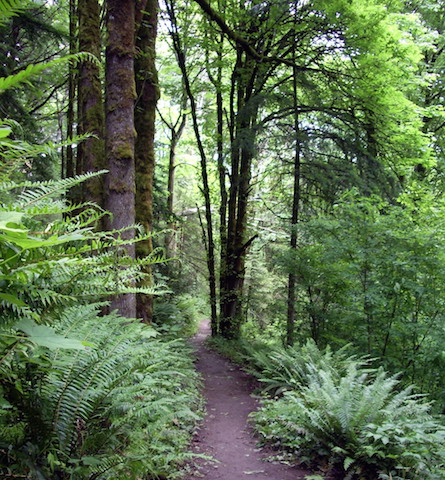
“The woods grew darker and a light rain began to fall. As they hiked deeper into the park, the only sounds were the drops of rain falling from the forest canopy, and Glover sniveling. It was hard to keep your mad on in all that fresh air and beauty, but Glover’s weeping helped her focus. A mile down a wooded hill, they came to an opening. ‘Here,’ Lennox said.”
—BETTING BLIND
Cup & Saucer
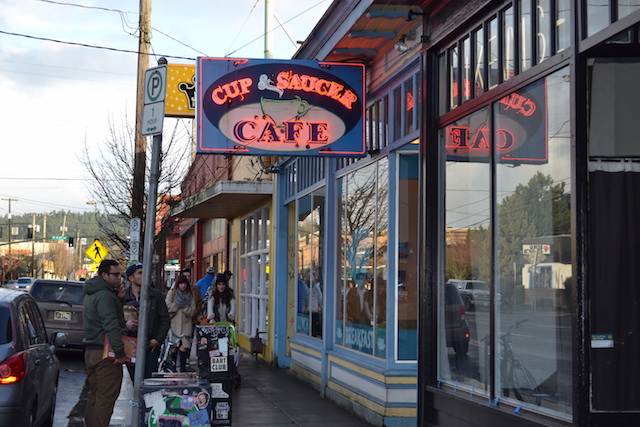
“Rain sheeted down the big windows of the Cup. Frank sat by the last big window street side. He wore a navy sweater and blue shirt, looking post-preppy and pretty darned wonderful. His face broke into this wide, wide grin for her when he caught sight of her entering the place. She waved and ordered her coffee from a waitress with blonde dreadlocks.
‘Hi there, stranger,’ she said.
‘I blame that on you,’ he said.”
—BETTING BLIND
‘Hi there, stranger,’ she said.
‘I blame that on you,’ he said.”
—BETTING BLIND
Esplanade
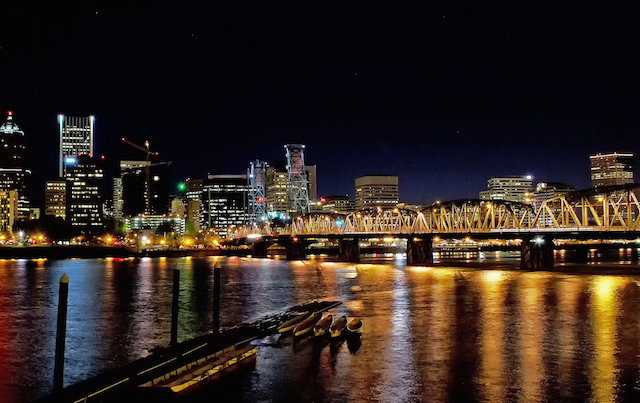
“They crossed the Steel Bridge back to the east side. Without asking him, she parked the truck by the river. He moved stiffly as they walked the wide steps down to the Esplanade, a series of boardwalks and floating docks, benches and sculpture that ribboned along the riverbank and under the freeway overpass. They stopped and sat on a bench facing the water. The benches were still damp from the afternoon rain. The moon appeared behind a ragged cloud and added its light to the city’s neon reflecting off the river.
‘Tell me,’ she said.”
—BETTING BLIND
‘Tell me,’ she said.”
—BETTING BLIND
Bijou Cafe
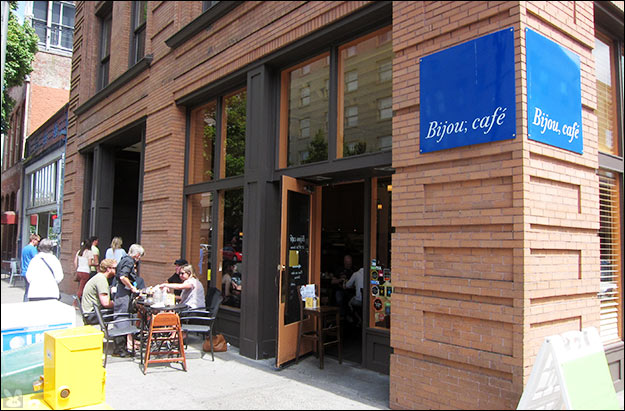
“It was eight in the morning and raining when Fulin walked through the front door of the Bijou Cafe. The Bijou was a hip, funky little place smack in the middle of Old Town, a place where the young drunks drink and drug side by side with the homeless. Old Town was both beautiful and derelict, with its homeless camped alongside the historic fountains and cast iron facades.”
—BETTING BLIND
—BETTING BLIND
Mt. Tabor
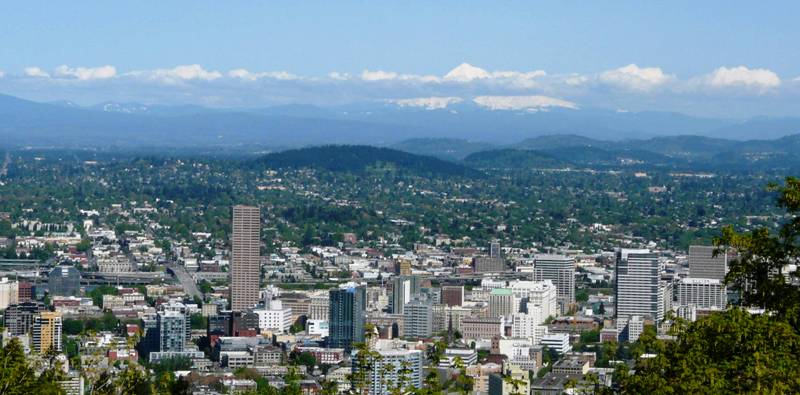
“Lennox rode the two elevators up to the aerie Kline called an office. The air smelled clean and sharp like it was oxygenated. And sky. Sky wherever you looked…Beneath her, the southeastern part of the city stretched across the valley floor and climbed Mount Tabor, a lava cone that loomed over the Hawthorne district.”
—BETTING BLIND
—BETTING BLIND
Copper Penny
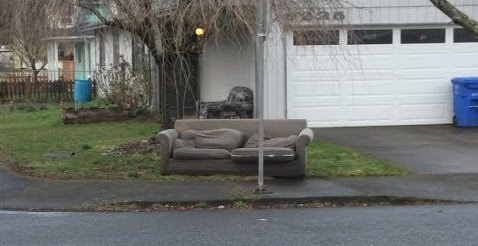
“Felony Flats was not called that to be funny. More ex-felons lived in the long stretch of scrubland in East County than anywhere in the city. As for theft, you were taking your chances leaving a locked car on the street.”
—BETTING BLIND
—BETTING BLIND
Felony Flats
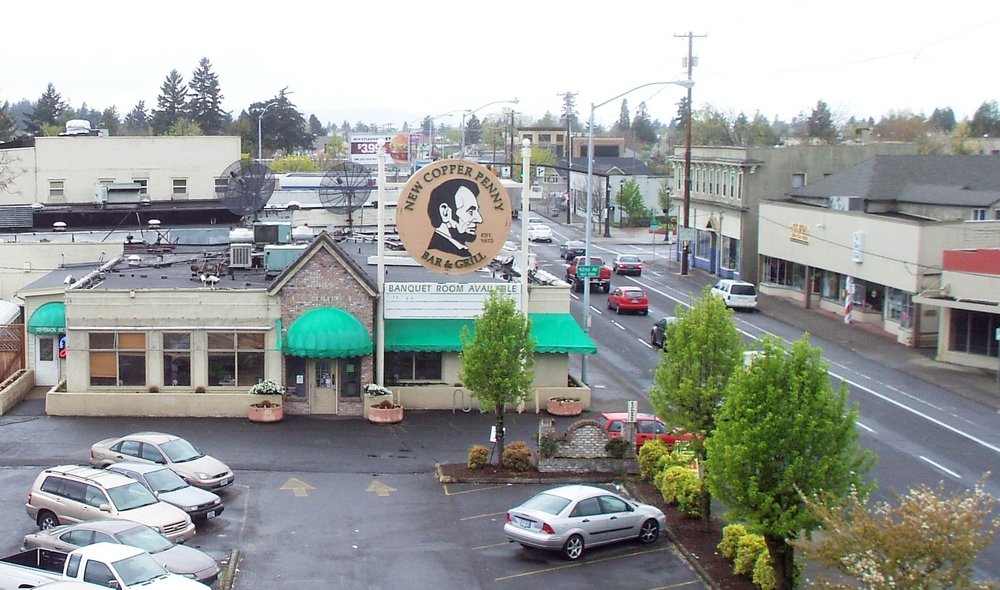
“They approached the Copper Penny, a bar known for its generous drinks and rowdy clientele. Two dog walkers were silhouetted in the neon from the bar’s sign. She was driving one second and the next second Joey had grabbed the steering wheel and pulled the Bronco over the curb and onto the sidewalk. Both dog walkers ran for their lives, hauling their dogs along with them, the walkers screaming, the dogs barking their heads off.”
—BETTING BLIND
—BETTING BLIND
Powell’s Books
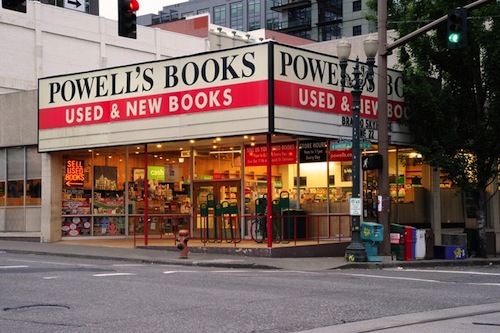
“Beneath the marquee, a large porch that could comfortably shelter thirty people and fifteen bikes. A twenty-year-old boy and girl in batiked rags sat partially blocking the entrance. They held cardboard signs asking for money. Lennox felt them staring at her white legs as she stepped onto the porch. A middle-aged man left the store with a canvas bag full of books. Two teenaged girls and an Asian boy stood by the bike racks. The girls had dyed black hair, the boy blond. All three wore eyeliner; all three were smoking. The girls sneered at Lennox, the boy giggled; smoke seeping from their curled lips.”
—BETTING BLIND
—BETTING BLIND
Portland International Raceway
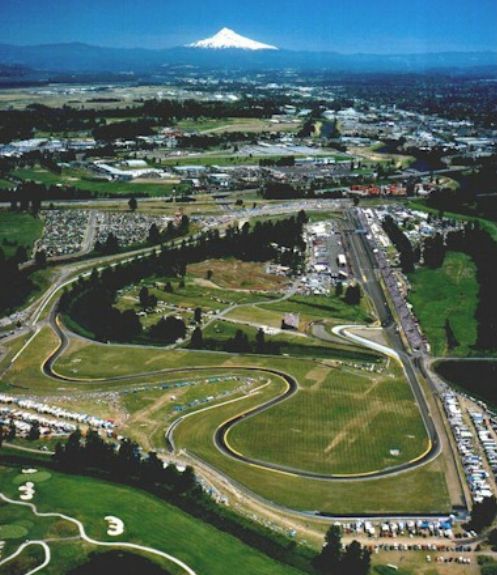
“Lennox hadn’t been out at PIR since she worked in vice years ago. The neighborhood was just the way she remembered: flat as a tabletop and covered in scrubby grass. The track itself ran just under two miles in length, stretched and folded to give the racers and their fans many opportunities to appreciate disaster.”
—BETTING BLIND
—BETTING BLIND
Meet Me at the Carts?
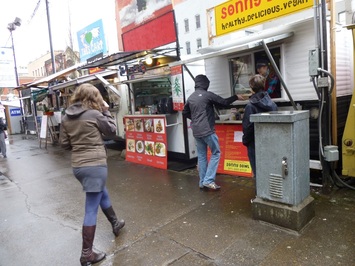
“Fried pies, Korean tacos, crepes and Portobello sandwiches, over a hundred food carts were available walking distance from the cop shop. Sarge’s favorite, the one Lennox always knew to meet him at, was Starchy and Husk. Starch was something Sarge missed, living with a lifetime member of Weight Watcher’s…”
—A BITCH CALLED HOPE
—A BITCH CALLED HOPE
Portland’s Oldest Bookstore: Cameron’s Books
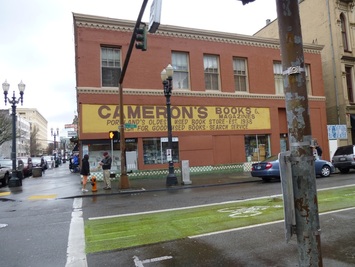
“The air was cold and damp. Lennox spotted Sarge’s bald head across the street from the carts under the porch roof of Cameron’s Books, holding a white carton in one hand and a plastic fork in the other, his back to the dusty plate glass. He looked decidedly grim as he shoveled the macaroni into his mouth.”
—A BITCH CALLED HOPE
—A BITCH CALLED HOPE
The Yuk Tav
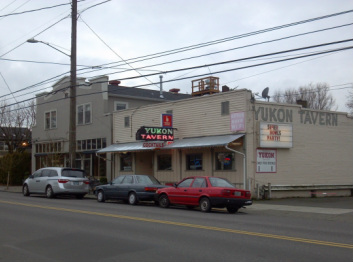
“The Yuk Tav was a whole different experience, a little oasis in a sea of starched tablecloths and waiters with Masters. The Yukon Tavern didn’t have a web site, didn’t have half its neon, but it served six different micro brews on tap and had a surprisingly good back bar. It was located in the Sellwood neighborhood, a tangle of shops and eating establishments both blue collar and la-di-da. It was an old favorite of Lennox and Tommy’s, least it used to be, dive bars being a hobby they both had shared.”
—A BITCH CALLED HOPE
—A BITCH CALLED HOPE
Council Crest
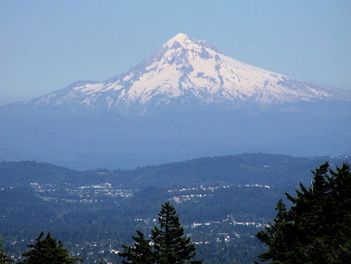
“Portland’s proletariat lived on the valley floor hemmed in by the Cascade and Coast Ranges. Over the neighbor’s roof lines or through the branches of the thirty-foot fir trees, you could see a thin strip of sky. The people with money climbed up off the floor and got themselves a view. And the highest best view in the city was at the top of an extinct lava cone called Council Crest. The Pike home was one of several old houses strung out like a necklace along the bluffs of the Crest.”
—A BITCH CALLED HOPE
—A BITCH CALLED HOPE
Portland’s dormant volcano, Mount Hood, Oregon’s tallest at 11,249 feet, floats over the Portland horizon on the clearer days.
Christmas Tea at the Heathman Hotel
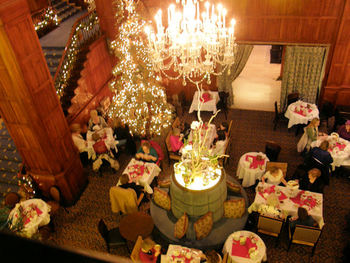
“Every year the twenty-foot Christmas tree was decorated with the same beach-ball-sized purple and gold ornaments, the tables set with same arrangements of holly, red roses and paperwhites. She and her mother always ordered the cucumber sandwiches, the pâté with Roquefort and pistachios, the scones, the sherry, the Earl Gray tea. The room always smelled of pine and bayberry and bergamot. Gary, the ageless piano player, played Christmas music on the baby grand at the far end of the room.”
—A BITCH CALLED HOPE
—A BITCH CALLED HOPE
Sandy Jug
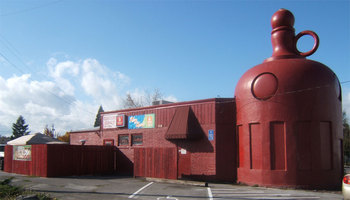
“The Pirate’s Cove–You’ll Treasure Our Chests—was just another windowless strip club, only difference being this club was an architectural destination. Built in the twenties, the stucco building was sculpted in the shape of an eighteen-foot jug of hooch, and forever after known as the Sandy Jug. Over the years the Jug had been painted mud brown, lilac, orange striped, pepto pink and brick red. It had been a diner, a soda fountain, a tire shop, an auto repair garage, a tavern and now a pirate-themed strip joint.”
—A BITCH CALLED HOPE
—A BITCH CALLED HOPE
Pal’s Shanty
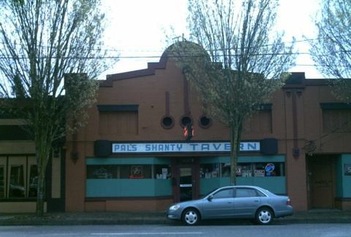
“Cops hung out at the Shanty, leastways those who worked Portland’s east side. But the Shanty wasn’t just a cop bar, it served working class people from the Hollywood district plus folks up the hill in the old-money houses that lined the Alameda.”
—A BITCH CALLED HOPE
—A BITCH CALLED HOPE
Three Groins in the Fountain
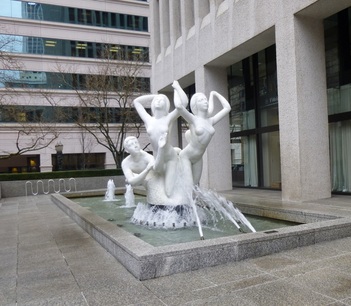
“The offices of Bowersox Etc. took up the entire twenty-second floor of the Standard Insurance Building, a big deal skyscraper that had its own sculpture, one the locals called Three Groins in the Fountain…”
—A BITCH CALLED HOPE
—A BITCH CALLED HOPE
Multnomah County Jail
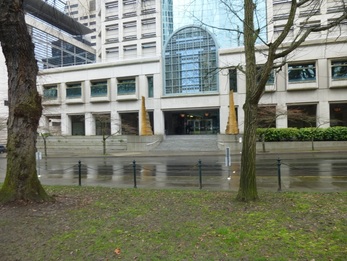
“The three of them passed through security and stood together in the high-ceilinged lobby of the jail. The floor was gray granite, the few sticks of furniture were black, one wall was covered with what looked like crumpled tinfoil, the other walls were gray. There was a slight oily tinge to the air, which added to the impression that they were standing inside a vast firearm.”
—A BITCH CALLED HOPE
—A BITCH CALLED HOPE
